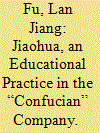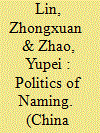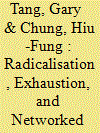|
|
|
Sort Order |
|
|
|
Items / Page
|
|
|
|
|
|
|
| Srl | Item |
| 1 |
ID:
190184


|
|
|
|
|
| Summary/Abstract |
China’s contemporary classics-reading movement (dujing yundong) has grown significantly since its emergence in the 2000s but remains little researched and is so far only known as part of the revival of Confucianism on the popular level. This study, based on ethnographic field research in ten Chinese cities, discusses the movement’s character under the lens of the grounded utopian movement theory and combines this with the civil sphere theory to exhibit the movement’s potential for social change under China’s specific socio political conditions. While activists hope that reciting and memorising Confucian classics will cultivate virtuous individuals (junzi) who will change Chinese society from the bottom up, this study shows that involved parents, teachers, and headmasters have greater potential to bring about social change. The space to induce change, however, is fragile.
|
|
|
|
|
|
|
|
|
|
|
|
|
|
|
|
| 2 |
ID:
190185


|
|
|
|
|
| Summary/Abstract |
Since the 1980s, the Confucian revival in contemporary Chinese society has grown as a local, national, and even global phenomenon (Billioud and Thoraval 2015; Hubbert 2019). While the Confucian revival is often perceived as propelled by the official endorsement of the Chinese Communist Party (CCP), this article focuses on a grassroots Confucian movement called dujing that is conducted in private settings outside state schools by adherents of the pedagogy, often contradicting the official educational policy and mainstream habit of reading. Dujing mobilises students (aged 4 to 18) to spend intensive time (eight hours a day) on repetitive reading aloud of ancient canonical texts without pedagogical exegesis (Billioud and Thoraval 2015; Wang 2018), which entails relinquishing mainstream schooling. Based on immersive and embodied participant observation, this article illustrates why and how students, teachers, and parents have become devoted to the radical practice of reading classics. Combining social study of Confucianism and anthropological scholarship on language and reading, this article articulates how the experiential repetition, long-term commitment, listening, interaction, and discipline in dujing schools help participants make sense of the dujing reading practice as the pursuit of dao, although this reading practice does not involve immediate interpretative labour to make sense of the classical texts being read. By comparing two dujing schools that practice distinct methods of reading, this article also shows the internal dynamic that drives the development, split, and reflection of dujing.
|
|
|
|
|
|
|
|
|
|
|
|
|
|
|
|
| 3 |
ID:
190186


|
|
|
|
|
| Summary/Abstract |
Based on fieldwork carried out between 2016 and 2020 in three Chinese private companies, this article analyses the implementation of jiaohua, a key idea in Confucianism, within a “Confucian” company. In the first two sections, I analyse the main measures put in place by this type of company in their attempt to model and transform the behaviour and state of mind of their employees. I then study the way in which the educational vocation of these entrepreneurs fits into an educational project supported by the authorities at the national level, the aim of which is to create a morally sound citizen. Taking account of the current sociopolitical context in China, it might be considered that the commitment of certain private entrepreneurs to the promotion of a “Confucian education” reflects their contribution to the making of the modern citizen that the state desires, as well as their conviction that Confucianism offers resources that will enable the construction of a Chinese capitalist ethic.
|
|
|
|
|
|
|
|
|
|
|
|
|
|
|
|
| 4 |
ID:
190183


|
|
|
|
|
| Summary/Abstract |
This article uses the theory of Chinese individualisation to understand the Confucian education revival by focusing on the rise of parents as critical individuals and a case study of one Confucian private school. Drawing on interview data from parental activists who enrol their children in the study of Confucian classics, this article presents the disembedding actions taken to break attachments to state schools and the paradoxical return to institutional safety. It finds that these parents exhibit ambivalence towards the state education system, and that family relationships affect individual parents’ decisions about Confucian education. Furthermore, this study discusses the implications of the individualisation dynamics for Confucian revival in reference to the reflexive conditions of modernity.
|
|
|
|
|
|
|
|
|
|
|
|
|
|
|
|
| 5 |
ID:
190188


|
|
|
|
|
| Summary/Abstract |
This article focuses on the carnival aspects of Chinese Internet culture, but it goes further by suggesting that the productiveness of the online carnival leads to the politics of naming in China’s specific context. This article illustrates the questions of how Chinese Internet users name themselves diaosi (“losers”) to separate and distance themselves from the governing power, how they identify the Zhao (“elites”) to form an internal antagonistic frontier in the “us vs. them” context, and how the diaosi are “floating” and appropriated as xiaofenhong (“little pinkos”) to identify the external enemy rather than the rulers inside. This kind of online carnival is not merely a cultural issue, but is also a political and governing theme that has its roots and routes in contemporary China’s governing rationality.
|
|
|
|
|
|
|
|
|
|
|
|
|
|
|
|
| 6 |
ID:
190187


|
|
|
|
|
| Summary/Abstract |
Between the Umbrella Movement in 2014 and the unprecedented mass protests in 2019, Hong Kong experienced a period of movement abeyance during which localism became a prominent political identification, notably among young people. Localism, defined as a reactive form of radicalism, was one pathway after a cycle of contention, alongside persistence with moderate claims and exhaustion, an affective process of detachment from contentious politics after mobilisation. However, the existing literature seldom explores individual attributes to these pathways during movement abeyance. Using survey data gathered from five local universities (N = 1,365), this study seeks to examine how cognitive appraisal of previous protest events, political emotions, and media use during abeyance predict radical and moderate political identifications among university students in Hong Kong. Youths with stronger devotion to the Umbrella Movement and negative emotions after it were more likely to identify as localists. However, youths with these attributes who perceived negative consequences of the Umbrella Movement showed a lower likelihood of being localists or pan-democrats. These results can elucidate the trajectories for radicalisation and exhaustion during post-Umbrella Movement abeyance.
|
|
|
|
|
|
|
|
|
|
|
|
|
|
|
|
| 7 |
ID:
190182


|
|
|
|
|
| Summary/Abstract |
Since the start of the twenty-first century, China has experienced a growing revival of references to the Confucian tradition in various realms such as politics, religion, social life, and education. Confucianism-inspired education is a central dimension of this “revival” and points to the various educative projects, initiatives, and activities invented and carried out in direct reference to elements of the Confucian heritage. Despite state power’s grip on society, it is noteworthy that ordinary people play a vital role in the implementation of such projects. It is therefore possible to speak of a bottom-up agency originating from grassroots society (caogen shehui 草根社會) or from “the space of the people” (minjian 民間). Nowadays, people from all kinds of social classes and professional and educational backgrounds produce and invent new practices, discourses, and approaches and associate them with the name of Confucius and, more generally, with the Confucian tradition. In so doing, they attempt to establish direct ways to interact with ancient sages through the study of the classics in a context where, at the same time, the authorities keep on emphasising the value of the “excellent Chinese traditional culture” (Zhonghua youxiu chuantong wenhua 中華優秀傳統文化). A body of research based on intensive ethnographic surveys has started to be published on the topic in recent years. It analyses the specificities of Confucian education within the overall framework of Confucian revival (Billioud and Thoraval 2015; Hammond and Richey 2015; Billioud 2018, 2021); the striking diversity of the pedagogical enterprises carried out in the name of tradition (Elizondo 2021); the links between Confucian education and the making of Chinese citizenship (Wang 2016, 2020, 2022c), moral anxieties (Wang 2022b), or utopianism (Gilgan 2022b); and the promotion of Confucian education within religious groups such as the Yiguandao (Billioud 2020) and Buddhist movements (Dutournier and Ji 2009; Ji 2018) or within the corporate world (Jiang Fu 2021).
|
|
|
|
|
|
|
|
|
|
|
|
|
|
|
|
|
|
|
|
|